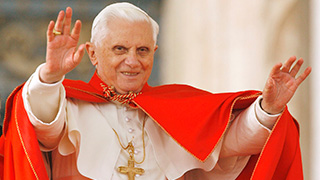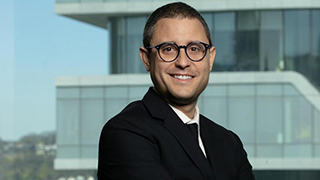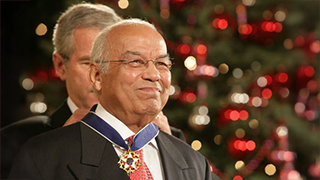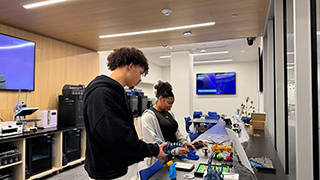Lives Touched by Pope Benedict XVI: Catholic Studies Faculty - Seton Hall University
Tuesday, January 17, 2023

The Department of Catholic Studies, established in 2012 – the Year of Faith, as proclaimed by Pope Benedict XVI – brings in faculty from disciplines across the University, to engage students of all majors in fruitful dialogue that forges connections among varying disciplines and pursuits. As three faculty members whose training is in different disciplines shared, Pope Benedict XVI’s understated profundity, humble virtuosity, and quiet fortitude left impressions on them, and these qualities remain significant to them in their reflections on his faith and leadership.
Joseph Rice, Ph.D., associate professor of philosophical theology at Immaculate Conception Seminary School of Theology (ICSST) and Adjunct Professor of Catholic Studies, described a significant interaction he had with then-Cardinal Ratzinger: "In 1996, if I remember the year correctly, I was asked to play the organ for a Mass celebrated by then Cardinal Ratzinger in the Church adjacent to the Teutonic Cemetery next to St. Peter’s Basilica. In Rome, the expectation is that the celebrant can intone the beginning of a prayer, such as the Credo, the Pater Noster, or a doxology, in any key, and the organist is expected to be competent enough to come in on the exact pitch set by the celebrant, even if the response is simply 'Amen.' Some organists would use a small keyboard or other device to quickly discover the celebrant’s tone in the few seconds that the intonation lasted. Although I don’t have perfect pitch, I always found it more discreet just to remember the last note I played on the organ and mentally identify the new tone in relation to it. This could be a challenge, as some celebrants would actually change keys during the same intonation. Ratzinger, in this respect, was extraordinary. He began the Mass in one key, and simply never wavered from that pitch at all during the entire Mass, which lasted over an hour. He was musically perfect. Rest in Peace, Pope Benedict, extraordinary theologian, gifted philosopher, a gift to the Church as Pope, an example of humility, and a bona fide musical talent, beyond the anecdotal piano playing that was his well-known hobby."
Reverend Joseph R. Laracy, assistant professor of systematic theology at ICSST and affiliated faculty member in the Department of Mathematics and Computer Science as well as the Catholic Studies Program, recalls how Pope Benedict XVI was influential for him as he discerned his vocation and during the formative years of his priesthood. He stated, "When Benedict XVI was elected in 2005, I was starting to discern a call to the priesthood. His theological writings and priestly example were a great inspiration for me. As a seminarian, I was very honored to speak briefly with him on two occasions at the Vatican. As a priest and professor, I continue to benefit from his theology in my preaching, teaching, and research. Perhaps Pope Francis put it best when he wrote, 'The depth of Joseph Ratzinger's thought, based on Holy Scripture and the Church Fathers is still helpful to us today … [The work of] Benedict XVI is and will always remain a fruitful thought and magisterium over time because he has been able to focus on the fundamental references of our Christian life: first and foremost, the person and word of Jesus Christ, and then the theological virtues, namely charity, hope, and faith. And for this the whole Church will be forever grateful to him. '"
Allan F. Wright, M.A., adjunct professor of Catholic Studies, recalls that his time chaperoning students as they attended Pope Benedict XVI’s meeting with young people and seminarians at Dunwoodie had a strong effect on him personally: "On April 19, 2008, I was a chaperone for 12 youths who attended Union Catholic High School in Scotch Plains, NJ. The day was filled with entertainers and music as we arrived around 10am and Pope Benedict didn’t arrive on stage until after 4pm. I remember vividly the adrenaline that rushed through me, quite to my surprise, the first time I saw Pope St. John Paul II in 1994 as he disembarked from his helicopter at World Youth Day in Denver, Colorado. I didn’t anticipate a similar reaction to being in the presence of this German pontiff and erudite theologian 14 years later, but as word spread that Pope Benedict was en route to the stage, there was a palpable energy and electricity that surged through the crowd as he approached in the popemobile."
"After his introductory remarks, I remember him speaking about the diversity of saints and venerable whose pictures adorned the stage that the Church honors. First on his list was St. Elizabeth Ann Seton, which immediately piqued my attention. He spoke about their backgrounds, rich and poor, missionaries, laymen and women, free people, and a slave if I’m not mistaken. Amid their diverse background, what bound them to each other was their love for Jesus. He encouraged the crowd of young people to continue the work of Jesus by bringing the Good News of Jesus Christ to whatever situation they found themselves in and to bring the presence of Christ wherever they go. As I was responsible for getting these 12 students back to the bus at Yonkers Raceway, I remember the conversations on that walk and on the bus ride home and what an impact he had on all of us."
While Pope Benedict XVI’s life on earth has ended, the effects of his scholarship, personal qualities, and ministry remain vibrant on Seton Hall’s campus through our faculty, ready to nourish the faith of our students and the people whose lives they will touch.
Categories: Faith and Service, Nation and World






